The concept of driverless cars, driverless trucks and autonomous vehicles may run a shudder up the spine of every professional truck driver. Why?
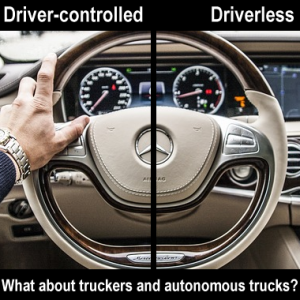 Not only does it imply an industry without truckers — and hence an end to the livelihood of millions of trucking industry employees — but a period of time between the start and completion of automation when there is likely to be some chaos on the roads.
Not only does it imply an industry without truckers — and hence an end to the livelihood of millions of trucking industry employees — but a period of time between the start and completion of automation when there is likely to be some chaos on the roads.
By the way, if you observe the introduction to the old Saturday morning cartoon “The Jetsons,” you will see that George Jetson is behind the controls and using a joystick to steer his futuristic air car.
So, for the purposes of this page, even his vehicle was not driverless.
Consider with us some things that need to be in place before driverless trucks take over the trucking industry.
To do this, we need first to consider the push for “driverlessness.”
One Desire for Driverless Cars: Freed Up Schedules
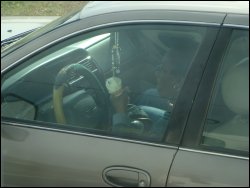 We know that some people would cheer the adoption of driverless cars simply from the standpoint that they are already driving in a distracted manner.
We know that some people would cheer the adoption of driverless cars simply from the standpoint that they are already driving in a distracted manner.
See here a photo Vicki took of a driver holding an ice cream cone in one hand.
Without having to be “bothered” with driving a vehicle, travelers would be freed up to talk on the phone, text, eat, drink, smoke, put on make-up, play Sudoku or other mobile app games, etc.
Throughout the centuries, there have been groups of people who have driven vehicles for others.
Today, they are known as drivers of buses, taxis, subways, trains and limousines.
There is even a classification of jobs in the Occupational Outlook Handbook for
Unfortunately, some people look down upon — or classify differently — those who move materials (truck drivers) or people.
In a YouTube clip (0:09-0:22) Sir Percival Blakeney from The Scarlet Pimpernel — the setting of which was near the start of the French Revolution around 1792 — exclaims (rather comically),
I must apologize for my tardiness. ‘Twas next to impossible finding a carriage. Sink me if everyone isn’t so equal in your new society that no one wants to do the driving anymore!
The Move Toward Driverless Trucks and Cars
One article stated:
… While most industry officials don’t envision a fully self-driving, or autonomous, vehicle before 2025, features such as adaptive cruise control or traffic-jam assist that automatically slow or apply the brakes for a car in certain situations are already being introduced. …(1)
dispatch.com/content/stories/business/2012/08/27/george-jetsons-ride/ (no longer online)
Evidently Land Line Magazine thought enough of the concept of driverless cars to ask in a poll (as of September 28, 2012), “Are self-driving cars the wave of the future?”
Impact on Traffic
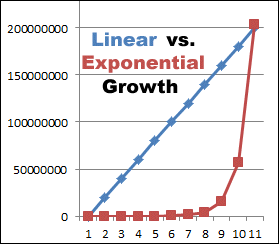 What impact will there be on traffic with driverless vehicles on the road?
What impact will there be on traffic with driverless vehicles on the road?
According to Wikipedia: “Overall, there were an estimated 254.4 million registered passenger vehicles in the United States according to a 2007 DOT study.”
Assuming that the technology expands to, say, only 200 million passenger vehicles, there are two potential models for adoption of it within a fixed time frame:
– linear (a constant rate) or
– exponential (multiply by previous amount).
What is the Timeline for Autonomous Cars?
A September 18, 2012, article from CNN — entitled “You won’t need a driver’s license by 2040” — stated:
The timeline for autonomous cars hitting the road en masse keeps getting closer. GM’s Cadillac division expects to produce partially autonomous cars at a large scale by 2015, and the automaker also predicts it will have fully autonomous cars available by the end of the decade.
Even so, driverless trucks may be a long time coming. We just don’t know yet.
Impact on Safety
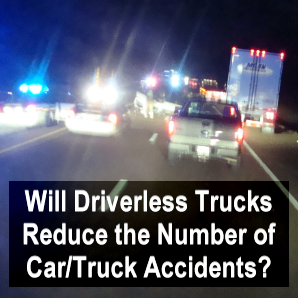 One question on our minds that is of definite interest to professional truck drivers is:
One question on our minds that is of definite interest to professional truck drivers is:
What impact will the use of driverless cars and driverless trucks have on the number of accidents and fatalities?
A September 25, 2012, article(2) entitled “California governor signs driverless cars bill” reported this:
“I think the self-driving car can really dramatically improve the quality of life for everyone,” Google co-founder Sergey Brin said.
Autonomous cars can make roads safer, free commuters from the drudgery of driving, reduce congestion and provide transport to people who can’t drive themselves, such as the blind, disabled, elderly and intoxicated, Brin said.
“I expect that self-driving cars will be far safer than human-driven cars,” Brin said.
A July 23, 2012, article from CNN opened:
Despite efforts to build cars to better withstand accidents and reduce threats posed by distracted driving, traffic fatalities for the first three months of 2012 have shown a “significant increase” compared with government statistics from a year earlier.
cnn.com/2012/07/23/travel/us-traffic-fatalities/index/ (no longer online)
Even if there was a completely automated system of transportation where no one drove anymore, would this be the elimination of all traffic accidents?
One would think that all “distracted driving” accidents would certainly disappear (unless, of course, the driverless cars got hacked).
If an accident involves a driverless vehicle, who will be held responsible?
Driverless Cars, OK. But What About Driverless Trucks?
Since this page was first written, there has been much talk — and much written — about autonomous trucks, trucks without drivers, driverless trucks — whatever you want to call them.
It’s one thing to dream of trucks driving themselves. It’s quite another thing to have completely driverless, autonomous or automated trucks.
See if you agree with us on the following speculation.
Before the technology of driverless trucks is fully adopted, engineers will have to come up with a way for articulated trucks to:
- Hook and unhook trailers by themselves (something we do not see happening with doubles and triples);
- Do hands-free pre-trip inspections;
- Check and sign for their own paperwork (or have a system by which this can be done remotely);
- Fuel themselves;
- Navigate and negotiate a plethora of docking situations (even in blindside backing situations);
- Open, close and lock their own doors (dry vans and refrigerated vans, primarily);
- Load and unload their own cargo (including strapping / chaining and tarping flatbed loads or connecting / disconnecting hoses on tankers);
- Automatically adjust tandems and other settings to be within legal axle limits and to provide maximum fuel economy;
- Schedule themselves for maintenance and repairs;
- Take themselves to shops for needed maintenance and repairs;
- Navigate every part of every route (including routing around all restricted roads and low clearances);
- Cross truck scales with precision;
- Apply and remove appropriate placards from trucks when required;
- Negotiate every aspect of every trip year-round, including the dreaded winter driving season; and
- Pay for tolls on routes that do not yet receive electronic toll payments.
Given enough money and technology, there is the possibility that driverless trucks that do all of these things may one day be built.
But we think that they will be a long time coming.
Other Repercussions of Driverless Trucks: Trickle Down Economy
Another issue at stake when considering driverlessness is the effect on every business that currently makes money from or by serving professional truck drivers.
Multiply that effect by the number of businesses affected and after a while it takes a real toll on the economy.
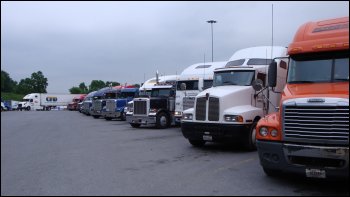 If driverless trucks become popular, there will be a decrease in demand for at least some products and services at travel plazas, stopping centers and truck stops — anywhere that a trucker currently pulls in, especially locations with overnight truck parking.
If driverless trucks become popular, there will be a decrease in demand for at least some products and services at travel plazas, stopping centers and truck stops — anywhere that a trucker currently pulls in, especially locations with overnight truck parking.
If a truck has no driver — and hence no need to abide by Hours of Service regulations — theoretically, it can roll around the clock.
There will be no need to stop for drivers to use the restroom, shower, eat, etc.
Driverless trucks will only need to stop for fuel, maintenance, repair and loading/unloading.
With constant use, the equipment will need to be serviced and repaired more often, which could increase the need for repair shops.
But then again, if the technology progresses to the point where driverless trucks are on the road, it is highly possibly that by that time there will be “mechanic-less repair shops” — where machines do all of the diagnosing and repairing of equipment.
In 2012, all of these things seem quite beyond our reach.
And for the sake of the millions of professional truck drivers currently working, we hope they are a long way off.
Update: On November 1, 2012, OverdriveOnline.com ran this article about driverless trucks. Notice that the linked Australian mines article features dump trucks that aren’t articulated.
Update: On March 1, 2013, we became aware of this article showing a convoy of self-driving trucks (with one actual lead human driver). Watch the videos about the test in Japan.
Update: On November 20, 2013, the Washington Post ran this article and Commercial Carriers Journal ran this article.
![]() Money saving tip: If you are spooked by the thought of one day being without a truck driving job — because your job may one day be done by a driverless truck — do what you can to get out of debt and save more money.
Money saving tip: If you are spooked by the thought of one day being without a truck driving job — because your job may one day be done by a driverless truck — do what you can to get out of debt and save more money.
Prepare yourself as best you can to find a line of work outside transportation, something that cannot be taken over by technology.
You may want to start earning a second income from the cab of your truck as a transition.
Always be on your guard concerning the vehicles around your rig — whether they are driven by a person or not.
Operate your truck safely. Don’t get rushed. Get out and look. Get ground help if necessary.
Do preventive maintenance on your truck (even if you don’t own it).
Don’t make your trucking company want to replace you with a driverless truck.
In other words, do the kind of job for your trucking company that you would want someone to do for you if you were paying him/her to do the same work.
Return from Will Driverless Trucks Ever Take Over the Trucking Industry? to our Truck Operations page or our Truck Drivers Money Saving Tips home page.
Reference:
1. www.dispatch.com/content/stories/business/2012/08/27/george-jetsons-ride/ (no longer online)
2. www.thestate.com/2012/09/25/2456208/calif-governor-to-sign-bill-to/ (no longer online)







